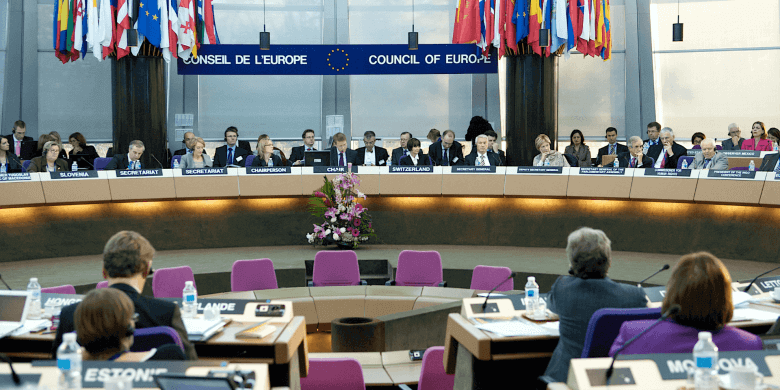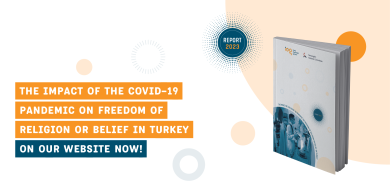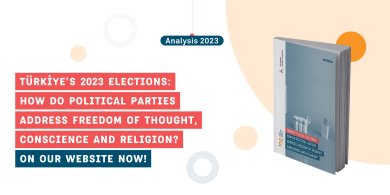Submission to the Council of Europe on ECtHR Alevi cases
Freedom of Belief Initiative made a submission to the Council of Europe Committee of Ministers regarding the implementation of ECtHR judgments on freedom of religion or belief.

The submission aims to provide information on the status of the general measures to be taken by the Government of Turkey on the enforcement of judgments of the European Court of Human Rights (ECtHR) and the compatibility of these measures with the European Convention on Human Rights (ECHR). The cases are under the enhanced supervision of the Committee of Ministers (CM).
The enforcement process of the Zengin Group of Cases v. Turkey, Cumhuriyetçi Eğitim ve Kültür Merkezi Vakfı v. Turkey and Izzettin Doğan and Others v. Turkey cases will be on the agenda of the Council of Europe CM meeting in December 2021.
The Zengin Group of Cases comprises of two important ECtHR judgments on the compulsory Religious Culture and Knowledge of Ethics (RCKE): Hasan and Eylem Zengin v. Turkey and Mansur Yalçın and Others v. Turkey. The judgments find that the content of the RCKE courses lacks objectivity, the education system has structural problems in respecting the rights of parents to raise their children in line with their religious or philosophical views, and that a reform process compatible with human rights standards on religious education in schools should be carried out without delay.
The Cumhuriyetçi Eğitim ve Kültür Merkezi Vakfı v. Turkey case, concerned the rejection of the Yenibosna Cemevi’s request that, as a place of worship entitled to coverage of lighting costs, the state covers the costs of their lighting. This request was refused on the grounds that “Cemevis are not places of worship”. The ECtHR found a violation of the prohibition against discrimination contained in Article 14, in connection with Article 9.
Similary, the subject of complaint of the Izzettin Doğan and Others v. Turkey was the rejection of requests for the religious public service provided to the majority of the population that follows the Sunni tradition of Islam to be offered to Alevis as well. The applicants requested that services connected with the practice of the Alevi faith constitute public service, Alevi cemevis be granted the status of places of worship, Alevi religious leaders be recruited as civil servants and a special provision be made in the state budget for the practice of the Alevi faith. In 2016, the ECtHR Grand Chamber ruled that Turkey violated Article 9, which protects the right to freedom of religion or belief, and Article 14, which prohibits discrimination, in conjunction with Article 9.
The CM’s latest deliberation on the Alevi cases took place in December 2019 and a Decision was adopted where the CM strongly encouraged the authorities to draw up a comprehensive action plan with a concrete calendar indicating specific legislative and administrative measures and, in view of the passage of time since the first of these judgments became final, to provide it to the CM by 1 June 2020.
Most recently, the Turkish authorities sent an Action Plan on Alevi cases in October 2021. In this Action Plan:
- Regarding Cumhuriyetçi Eğitim ve Kültür Merkezi Vakfı v. Turkey, the authorities cite several domestic court decisions accepting the objection of Alevi associations to the electricity bills. Additionally, it is stated that it cannot be estimated whether the illuminating costs are demanded by each cemevi and that an expert review is required to establish what percentage of the illuminating costs relate to the worship services. It is argued that, considering the compatibility of the jurisprudence created by the high judicial authorities with the ECtHR decision, this would constitute a sufficient measure.
- With regard to Zengin group of cases the authorities state that rather than broadening the extent of the exemption, “overhauling the content” of the “RCE” lessons would be appropriate and the new curriculum of the compulsory RCE classes, which is currently being implemented, and the purpose of these classes are compatible with the principles of pluralism and objectivity.
- Regarding the case of Izzettin Doğan and Others v. Turkey, there are no specific measures taken or planned.
However, both the Action Plan submitted to the CM and the national Action Plan on Human Rights announced in March 2021 do not refer to any concrete measures to prevent similar violations from happening. Furthermore, to date, the authorities have not made public any specific and relevant measures that would be taken.
In the light of this information, the following points were noted in the submission on the cases:
- With regard to Zengin group of cases, the findings of a recent human-rights based evaluation of the RCKE lesson textbooks that are used throughout 4-12th Grades in the Turkish education system and the exemption mechanism of the RCKE lessons are underlined.
- The review demonstrates the incompatibility of the teaching materials with the general measures indicated by the ECtHR as well as the Toledo Guidelines on Teaching About Religions and Beliefs in Public Schools. The findings reveal that the current teaching materials of the compulsory RCKE course constitute religious education/instruction and are not objective teaching about religions. Therefore, under international human rights law the course cannot be compulsory. If religious instruction is compulsory a non-discriminatory exemption procedure must be adopted.
- As a result of the non-implementation of the ECtHR judgments on the Zengin group of cases, potentially the rights of thousands of students and their parents’ rights at the intersection of freedom of religion or belief (Article 9) in the context of education (Article 2 Protocol I) continue to be violated.
- Regarding the Cumhuriyetçi Eğitim ve Kültür Merkezi Vakfı v. Turkey case, no legislative or administrative measures have been taken to date by the Government. While court judgments are important, they do not set a precedent that all courts must follow. Nor are they binding for the cases of cemevis other than those parties to these relevant cases. To be able to benefit from the exemptions for the electricity bills, every cemevi would have to pursue judicial remedies. This would be a costly, burdensome, and lengthy process. Not every cemevi would have the human and financial resources to pursue this path.
- Despite several favourable judgments, the Government remains therefore under a positive obligation to put in place a non-discriminatory, clear, foreseeable, and easily accessible process for accessing benefits applicable to places of worship.
- The Government has not yet taken any specific measures to address the findings of the İzzettin Doğan and Others v. Turkey judgment. Significant restrictions on the practice of many religions or beliefs, including Alevism, remain in force. The October 2021 Action Plan does not include any specific measures that are planned to prevent similar violations from happening.
Accordingly, in the submission, it was recommended that the CM make the following requests from the Turkish government:
With regard to Zengin Group of cases;
- to inform the CM about any work on the implementation of the judgments of the Zengin group of cases,
- to bring the Turkish educational system and domestic legislation into conformity with the Convention without delay – in particular, by remedying the shortcomings in the current arrangements that are in the areas of textbooks and exemption rules,
- to take steps to implement non-discriminatory exemptions without delay,
- to provide statistics on the exemption applications made by parents and first degree and high domestic court decisions taken on the denial of exemption claims,
- to provide a new Action Plan, setting out plans to bring about these changes.
With regard to Cumhuriyetçi Eğitim ve Kültür Merkezi Vakfı v. Turkey;
- a non-discriminatory process is put in place through legislative and administrative amendments about acquisition of place of worship status and ensuing benefits that does not require cemevi associations to pursue legal remedies in each case to challenge the orders or payment for illumination charges,
- to make public the status of any concrete steps that are planned or are being taken about the implementation of this judgment,
- to engage in an inclusive and open process of consultation to identify the best procedure for the acquisition of place of worship and benefits that this status confers,
- to provide information on the implementation of the domestic court decisions,
- The Government provide a new Action Plan, laying out plans to bring about these changes.
With regard to İzzettin Doğan and Others v. Turkey case;
- to start an inclusive and public consultation process, with the participation of relevant civil society organizations to address the freedom of religion or belief issues raised by the judgment,
- to enact draft legislation to enable religious or belief communities to acquire legal personality, as such, in line with Article 9 and Article 11 of the ECHR and the OSCE/VC Joint Guidelines on Legal Personality of Religious or Belief Communities,
- to ensure that equality and neutrality are observed in religious public services and the allocation of public funds,
- to take measures to address the restrictions on the right to freedom of religion or belief of the Alevi community, including the lifting the prohibitions on the use of religious titles and recognizing the status of cemevis,
- to provide a new Action Plan, laying out plans to bring about these changes.
Please click here to access the submission.


